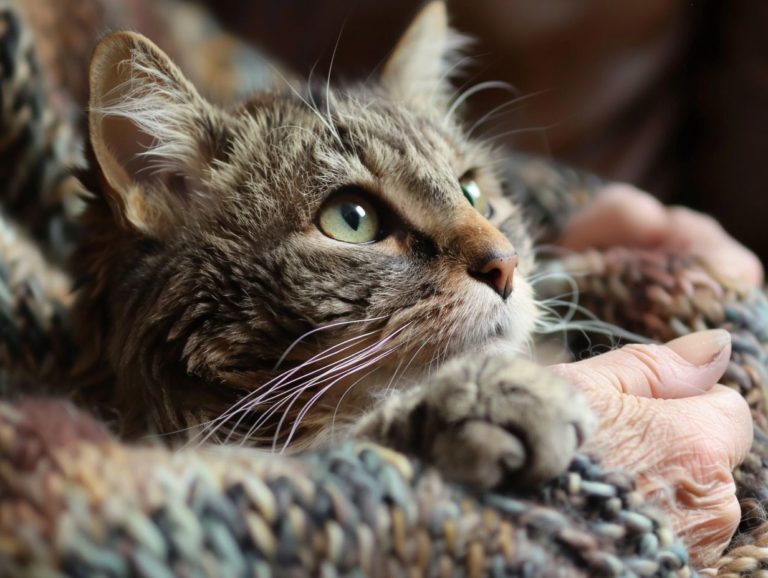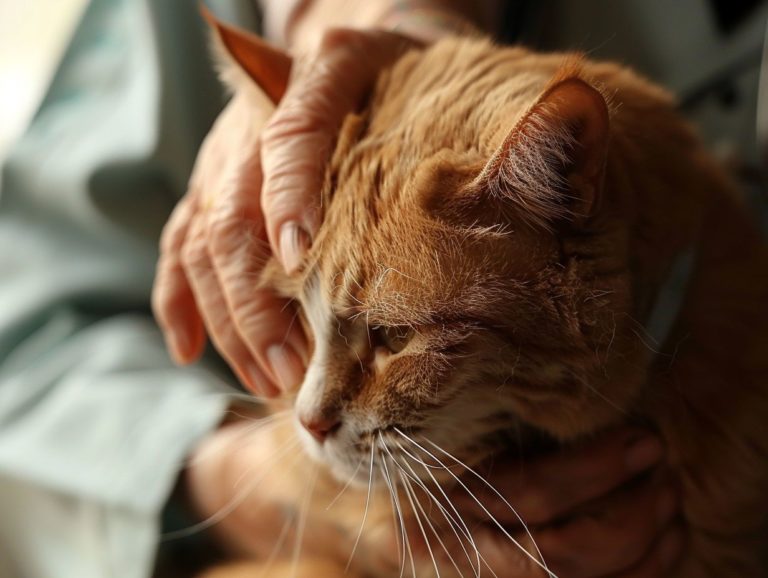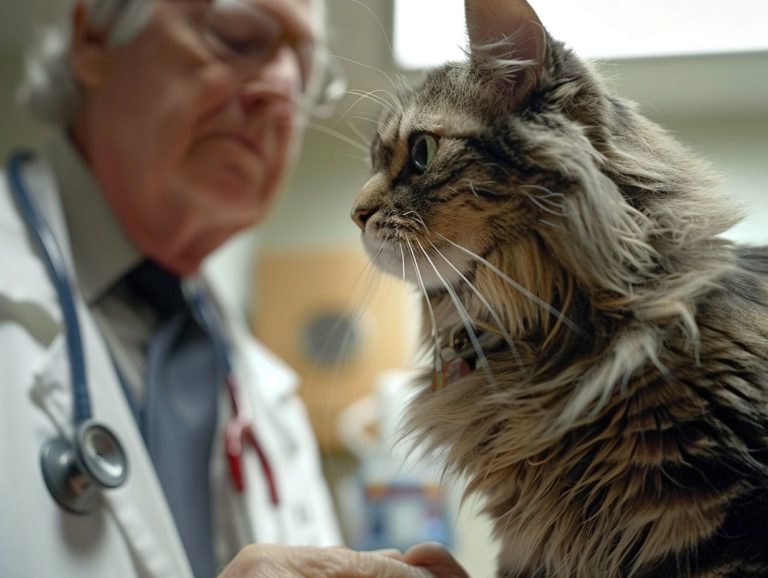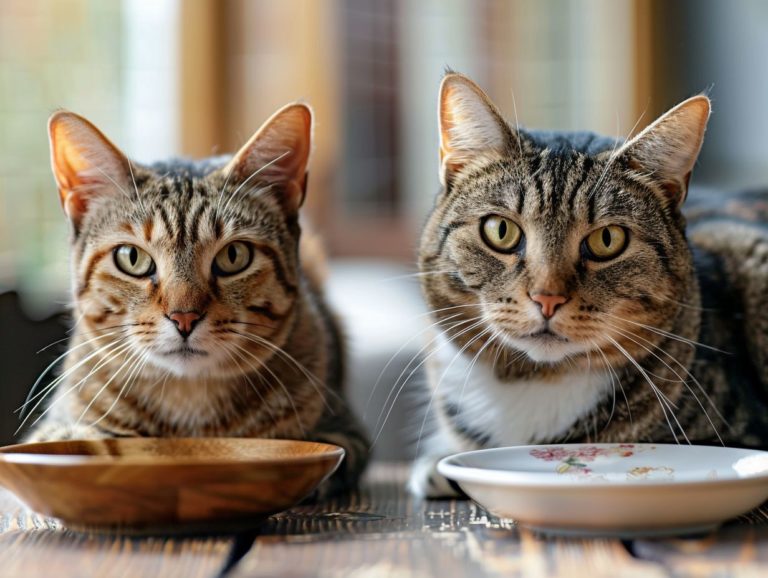Special Considerations For Senior Cats With Chronic Conditions
This article will explore the aging process in cats, common health problems found in senior cats, managing chronic conditions with medication, treatment options, and dietary considerations. It will also offer guidance on mental and emotional support, along with tips for creating a supportive environment that meets the changing needs of senior cats.
We will discuss how to collaborate with your vet to create a personalized care plan for your senior cat. The aim is to provide you with insights into what to anticipate and how to offer the best care and support for your aging feline companion.
Key Takeaways:
The Aging Process in Cats
Understanding the aging process in cats is crucial for cat owners, veterinarians, and caregivers as it involves numerous physiological changes that impact their body systems, immune function, skin elasticity, and overall health. Aging cats experience changes that affect various body systems, which may pose greater concerns compared to normal aging.
For instance, as cats age, their immune system may weaken, increasing their susceptibility to infections and diseases. The skin of aging cats tends to lose elasticity and become more fragile, leading to sagging and wrinkles. These physiological changes can also influence their digestive system, dental health, and mobility.
Regular veterinary examinations are essential for senior cats to monitor and address any age-related health issues. Providing a well-balanced diet, engaging in low-impact exercise, and maintaining proper grooming practices are key elements in promoting the overall well-being of aging cats.
Common Health Concerns for Senior Cats
Common health problems in senior cats include arthritis, dental disease, kidney disease, weight loss, dehydration, and urinary problems. Arthritis, characterized by joint inflammation, is prevalent in older cats and can cause stiffness and difficulty in walking. Dental disease manifests as bad breath, swollen gums, and eating difficulties. Kidney disease is marked by increased water intake and urination. Weight loss and dehydration are early signs of health issues in senior cats. Urinary problems like frequent urination or accidents outside the litter box may indicate bladder issues.
Regular veterinary care is crucial for early detection and proper management of these conditions in senior cats.
Managing Chronic Conditions in Senior Cats
Managing chronic conditions in senior cats involves medications, treatment options, and specific care considerations for ailments such as kidney failure and osteoarthritis.
Optimal management of these chronic conditions often entails the use of prescription medications to alleviate symptoms and slow disease progression. For instance, for kidney failure, specialized diets low in phosphorus and high in moisture content can aid in supporting renal function.
Regular veterinary check-ups are essential to evaluate the overall health of the cat, monitor the effectiveness of the treatment plan, and make necessary adjustments to ensure the cat receives the best care for their specific condition.
Medication and Treatment Options
The medication and treatment for senior cats may involve managing osteophytosis, maintaining dental health, providing mental stimulation, addressing pain symptoms, and ensuring proper nutrition.
Osteophytosis, characterized by abnormal bony outgrowths around joints in senior cats, can be managed with pain medications, joint supplements containing glucosamine and chondroitin, and, in severe cases, surgery.
Dental health can be upheld through regular professional cleanings, dental diets, and dental chews. Providing mental stimulation for senior cats can be achieved through interactive toys, puzzle feeders, and environmental enrichment.
Pain symptoms in senior cats can be alleviated with medications prescribed by a veterinarian, such as nonsteroidal anti-inflammatory drugs or opioid medications.
Dietary Considerations
Diet and proper dietary considerations play a crucial role in maintaining the overall health and well-being of senior cats, encompassing dental health, food and water intake, weight management, tooth brushing, and managing reduced appetite.
Dental Health: Proper dietary considerations, including the choice of food, can contribute to maintaining the dental health of senior cats. Dental issues in cats can cause discomfort and impact their dietary habits and nutrient intake. For cats’ senior health considerations, it’s essential to address dental care.
Food and Water Intake: Monitoring the daily food and water intake of aging cats becomes essential to ensure they receive the necessary nutrients. Supplementary nutrients may be required if appetite problems arise and they fail to consume the required amount of food.
Weight Management: Managing weight is a vital dietary aspect for senior cats. Obesity can worsen age-related health problems, while being underweight may result from disease or malnutrition. A veterinarian should be consulted for proper diagnosis and treatment.
Tooth Brushing: Alongside proper dietary considerations, regular tooth brushing can benefit senior cats, although it may be challenging to carry out with cats compared to dogs. Cat-specific toothpaste and toothbrushes should be used, avoiding human toothpaste.
Reduced Appetite: In cases of reduced appetite in senior cats, offering a variety of cat foods, including wet food, can help stimulate their appetite. Canned cat food, with its stronger aroma, is often more appealing to senior cats. Hand-feeding, food-related play, or feeding in a calm, stress-free environment can also encourage their appetite.
Mental and Emotional Support for Senior Cats
Providing mental and emotional support for senior cats is essential to ensure their overall wellness and quality of life. This support encompasses mental stimulation, emotional comfort, maintaining predictable routines, addressing behavior changes, and using nightlights to aid with vision.
Interactive play sessions with specialized toys offer mental stimulation through physical activity and the refinement of sensory skills. Providing soft, warm bedding in quiet, safe spaces offers emotional comfort and a sense of security. Scratching posts and perches can be utilized to promote natural behaviors.
In cases of behavior changes, patience, understanding, reassurance, and gentle guidance are crucial. Establishing a calming environment with soothing music or pheromone diffusers can help alleviate stress and anxiety for senior cats.
Addressing Cognitive Decline and Behavioral Changes
Cognitive decline and related behavioral changes are common in senior cats, often linked to illnesses such as arthritis, grooming difficulties, hearing impairment, reduced mental stimulation, and pain symptoms. These challenges may present as alterations in sleep-wake cycles, changes in relationships with human and pet companions, and decreased interest in play.
Owners can support their senior cats by creating a stimulating and interactive environment that includes toys and feeders, and by regularly scheduling playtime. Regular grooming and providing comfortable rest areas are also essential in mitigating the negative effects of cognitive decline. A routine vet visit can aid in monitoring and managing underlying conditions contributing to age-related changes in senior cats.
Creating a Comfortable Environment for Senior Cats
Proper care for a senior cat involves various components, including home care, claw trimming, monitoring drinking habits, addressing balance issues, and managing urinary issues.
Home Care for Senior Cats is essential, and creating a senior-friendly environment includes home modifications such as installing ramps or low steps to assist older cats in reaching elevated areas easily. Providing soft, comfortable bedding in different locations throughout the house promotes easy rest. Regular grooming, including brushing to prevent matting, and monitoring dental health are crucial aspects of care. Ensuring easy access to fresh water by placing multiple water bowls in different locations around the house encourages hydration. Behavior monitoring is important to detect changes in appetite or mobility that may indicate age-related issues.
Adapting the Home for Mobility and Comfort
- Providing accessible water bowls: Older cats may struggle to reach water bowls, leading to dehydration. Placing accessible water bowls around the house can help prevent this issue.
- Installing nightlights for visibility: Senior cats often have poor visibility, especially at night. Nightlights can aid them in navigating around the house and avoiding accidents.
- Monitoring weight: Senior cats are prone to weight loss, which can reduce insulation. Regular weight monitoring and a suitable diet can help maintain their warmth and strength.
- Managing toilet habits: Senior cats may have difficulty controlling their bladder and bowels. Offering easily accessible litter boxes can help them maintain cleanliness and dignity.
- Ensuring easy access to water sources: Many senior cats face dental issues and decreased appetites, making water accessibility crucial for hydration and kidney health.
- Creating cozy resting areas in quiet spots: Senior cats require peaceful resting areas, especially as they may find it challenging to get comfortable in high-traffic areas.
- Providing soft bedding to relieve pressure on joints: Older cats often experience arthritis, and soft bedding can alleviate discomfort and support their joints.
- Incorporating ramps or steps for reaching high places: Senior cats may struggle with jumping, making ramps or steps essential for accessing elevated spots.
- Installing handrails along stairs: Arthritis in the legs can impact a senior cat’s ability to navigate stairs. Handrails offer support and ease climbing.
- Ensuring easily reachable litter boxes for maintaining cleanliness despite bladder control issues.
- Providing easily reachable scratching posts to exercise joints and maintain limb health.
- Scheduling regular veterinary check-ups to detect health issues early and administer proper treatments.
- Maintaining a familiar routine to reduce stress and keep senior cats calm and content.
Working with Your Veterinarian
Collaborating with a veterinarian is essential for the comprehensive care of senior cats. This includes regular veterinary exams, addressing weight loss, monitoring hydration levels, managing balance issues, and discussing changes in toilet habits.
Regular veterinary exams can detect problems early that may not be obvious to the owner and provide peace of mind for the owner regarding their pet’s health. Veterinarians help manage symptoms and provide a custom solution for common ailments in senior cats, such as arthritis, dental issues, and kidney disease. A veterinarian who understands the needs of senior cats can help owners implement proactive healthcare strategies to ensure a better quality of life and, potentially, a longer one.
Collaborating on a Care Plan for Your Senior Cat
The components of a comprehensive care plan for senior cats include regular dental checks, health assessments, hydration monitoring, weight control, and contributions to charitable feline organizations. These key processes ensure the well-rounded and high-quality care of senior cats.
Regular dental check-ups are important for preventing dental diseases and maintaining oral health, which is vital for their comfort and eating habits. Health assessments enable early detection of potential health issues, leading to timely treatment and control. Monitoring hydration levels is crucial for preventing dehydration in older cats.
Participating in charitable activities such as donating to feline welfare organizations can assist cats in need and enhance the broader feline community.
Frequently Asked Questions
What are some common chronic conditions that senior cats may experience?
Some common chronic conditions in senior cats include kidney disease, arthritis, thyroid disease, and dental issues.
Why are senior cats more susceptible to chronic conditions?
As cats age, their bodies become less efficient at repairing and maintaining themselves, making them more prone to developing chronic conditions.
How can I tell if my senior cat has a chronic condition?
Some signs to look out for include changes in behavior, weight loss, decreased energy levels, and changes in appetite or bathroom habits. It is important to bring your cat to the vet for a proper diagnosis.
Can chronic conditions in senior cats be managed or cured?
While some chronic conditions can be managed with medication and proper care, there is no known cure for most chronic conditions in senior cats. The goal is to improve their quality of life and manage their symptoms.
Are there any special considerations for managing chronic conditions in senior cats?
Yes, senior cats with chronic conditions may require more frequent vet visits, specialized diets, and modifications to their living environment to accommodate their needs.
Is it safe to give my senior cat over-the-counter medications for their chronic condition?
No, it is not safe to give your senior cat any over-the-counter medications without consulting with a veterinarian first. Many medications for humans can be toxic to cats and may have adverse effects on their health.




